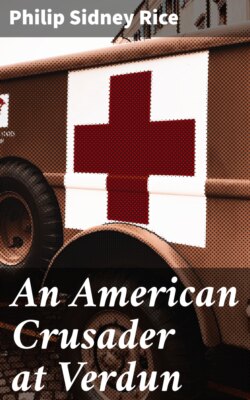Читать книгу An American Crusader at Verdun - Philip Sidney Rice - Страница 6
На сайте Литреса книга снята с продажи.
ОглавлениеII
Table of Contents
“Over There” at Last!
Friday, the twenty-second day of June, I arose upon a birthday anniversary. I had no intention of observing it, but I felt in a vaguely definite way that something interesting was to happen before the day was over; and this feeling was not long in growing from the vague to the definite.
From the time of reaching Paris I was busily engaged in various ways at the headquarters of the American Field Service while impatiently waiting my turn to go to the front. I was more than impatient—at times I was fretful. I even believe that upon cross-examination the heads of the service would admit that I was absolutely annoying. I supposed that I would be assigned to a new ambulance section soon to be organized, but on this day I have mentioned, I was informed that I was to fill a vacancy in Section Number One, the oldest American Field Section serving with the French army. I was in luck. Section One had been at the Battle of the Marne, it had served in Belgium—it had been at Verdun in 1916 and had gained a glorious record for itself at various places along the Western Front. I was to be prepared to leave Paris on Sunday morning, and to my delight I learned that Frederick Norton was also to join the same Section.
While working together in the Paris headquarters we discovered that we had many mutual friends and this naturally put us on a friendly footing from the beginning. We found that our ideas coincided about many things and about people. I thought Norton had some pretty good ideas and was an excellent judge of people. Sometimes when we were talking together he would say about someone: “How do you size him up?” And I would tell him. Usually our ideas coincided. Norton had been a traveller—he had been to Alaska—he had been North with Peary—he had been to Japan—he already knew something of France—he had been a hunter—he had a pilot’s license to drive an aeroplane—he had done some toboganning and skiing in Switzerland, which are not sports for the timid. These things I learned from him slowly, for he was extremely modest and not given to talking about his exploits. I was glad when I found that we were to start for the battle front together, and he was kind enough to say that he was glad, too.
Saturday night and a short “Good-night” to Paris. A short “Good-night” because cafés close at nine o’clock, and besides I must be up early the following morning. In company with my delightful pagan friend “Bridgey,” I went around to a little quiet out of the way café, which was hardly known to Americans. The little café was kept by an elderly lady whose husband had been killed in the war and by her daughter whose husband had also been killed in the war. This mother and daughter were excellent cooks, but their place was plain and comfortable. There was sawdust on the floor. Sitting in the little back dining room we could see into the kitchen and watch the meal being prepared. Across the street in the “Chinese Umbrella” there was more ostentation, style and atmosphere. The “Chinese Umbrella” was patronized mostly by Americans and the atmosphere was not Parisian.
“Bridgey” had invited me there for a quiet, exclusive farewell supper, and as we sat in the back room of the café he regaled me with an account of how he had tried for aviation the day before. He was nearsighted and wore spectacles, without which he could scarcely see across the room. From a friend he had procured a copy of the alphabet eye test and had tried to commit it to memory; he reported for examination with spectacles in his pocket. He missed on the third letter, and being brusquely informed that he had failed, “Bridgey,” who certainly had a sense of humor, smilingly adjusted his spectacles and bade adieu to the inspecting officer.
Supper finished, I said “Au ’voir” to Madame and her daughter, the two war widows, and then went off to bed.
“Bridgey” was on hand next morning to see us start for the front. A few other acquaintances were at the station, too. I have not seen “Bridgey” since but I heard that he was at Verdun during the big offensive.
Norton and I boarded the twelve o’clock train bound for the front. The train was crowded with French officers, grey haired Generals, Colonels, officers of all ranks and of various branches of the service. There were very few civilians and not half a dozen women. Twelve o’clock, and Paris faded behind us as we started for the battle front.
